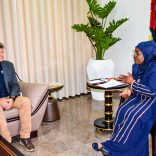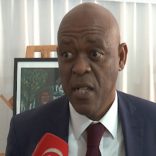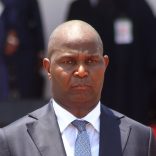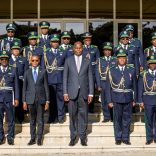Mozambique: Mais Integridade calls for transparency in appointment of civil society personalities - ...
Mozambique reinstates mandatory military escorts on national roads

File / A military convoy, during the 2013/14 conflict in Mozambique's national road number 1
Mozambique defence and security forces are today reinstating mandatory escorts for vehicles on the Save-Muxungué section of the N1, because of the threat of attacks by armed groups, Police of the Republic of Mozambique (PRM) spokesman in Sofala Sididi Paulo has told Lusa.
“We have reinstated escorts in the Save-Muxungué section to ensure people’s safety” in the wake of a recent series of attacks attributed to Renamo (Mozambique National Resistance), Paulo says.
The same measure was in force on the same section of road between 2013 and 2014, the last political and military crisis between the government and Renamo, but attacks nevertheless left a number of dead and wounded and caused much damage to the economy.
“This section was the scene of such incidents before, and in face of these latest developments, we decided to go back to the convoy system to protect the population,” Paulo explained.
According to Paulo, the convoy system is the same as before: “a military vehicle in front, one in the middle and a third one at the end of the column,” Paulo said, adding that the situation is calm.
“The situation is under control. We have not recorded any incidents since yesterday’s attack [Wednesday].”
Paulo did not give an end date for the escorts, saying that “the system will remain in place until we are sure that it is safe for people to travel”.
Recent attacks attributed to armed Renamo elements have brought uncertainty back to traveling on the EN1, the only road linking the south to the centre and north of Mozambique. Attacks have focused on the Save-Muxungué section and Gorongosa and Maringué in Sofala province.
A European Union (EU) diplomatic source expressed concern on Wednesday about the “general deterioration” in the political and security situation in Mozambique, hoping for an immediate end to the attacks attributed to Renamo in the centre of the country.
On the eve of a visit to Mozambique of the EU High Commissioner for Foreign Affairs, the European bloc says that the recent attacks on the country’s principal highway endanger safety and law and order and wants the perpetrators to “stop immediately”.
Mozambique has been experiencing political instability for several months, with the leader of Renamo threatening to take power in six northern and central provinces of the country, where his movement claims victory in the 2014 general elections.
This is the worst crisis in Mozambique since the Cessation of Military Hostilities Agreement was signed on 5 September 2014 by former President Armando Guebuza and the Renamo leader Afonso Dhlakama.
The government and Renamo have accused each other of abduct ions and murders of their members in recent weeks, and Renamo has asked South African PresidentJacob Zuma and the Catholic church to mediate in the its stalled dialogue with the government.
Mozambican President Filipe Nyusi has reiterated his availability to meet the leader of Renamo, but Afonso Dhlakama believes that there is nothing to talk about, Frelimo having rejected Renamo’s request for a revision of the constitution to make possible the creation of the new autonomous administrative regions demanded by the opposition, and saying that dialogue would only now resume after Renamo had taken power in the centre and north of the country.












Leave a Reply
Be the First to Comment!
You must be logged in to post a comment.
You must be logged in to post a comment.